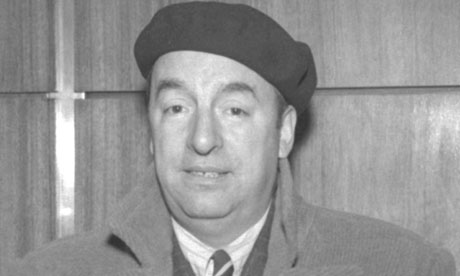
The remains of the Nobel prize-winning poet Pablo Neruda are to be removed from his grave in Chile as part of an investigation into his death nearly 40 years ago.
A team of forensic specialists will remove bones from the casket where he lies near his seaside home on Monday morning.
Neruda, who died suddenly 12 days after the 11 September 1973 military coup that brought General Augusto Pinochet to power, had suspected prostate cancer and for decades it was assumed that he had succumbed to the disease.
But two years ago when Neruda's bodyguard and driver, Manuel Araya, began describing his recollections of the poet's last days, a new narrative was born: the Pinochet regime eliminated Neruda to avoid the possibility that he would become a renowned voice of dissidence.
Neruda was known for his erotic, passionate, romantic poetry, particularly Twenty Love Poems and a Song of Despair. He was also a leftwing politician, diplomat and close friend of President Salvador Allende, who killed himself rather than surrender to Pinochet in the 1973 coup.
Araya said that while Neruda was making final preparations for exile in Mexico, doctors injected the poet with a substance, after which his health rapidly deteriorated.
The investigating judge, Mario Carroza, originally doubted the conspiracy theory but his inquiry over the past two years has uncovered sufficient evidence to order the exhumation.
Among the more damning pieces of evidence are reports from the pro-Pinochet El Mercurio newspaper the day after Neruda's death, referring to an injection immediately beforehand. The official death certificate said an advanced and incurable cancer led to malnutrition and wasting away.
"There were three main voices who could have continued the Allende legacy," said Eduardo Contreras, a Chilean lawyer who has been pushing for a thorough investigation of Neruda's death.
"There was Allende, Víctor Jara [the folk singer] and Pablo Neruda. Allende died on the day of the coup, Jara soon after, the only one left was Neruda. Why not eliminate the third symbol? I can't assure that he was killed or who might have done it, but there are too many suspicious acts [not to investigate]."
The Pablo Neruda Foundation, which manages the poet's estate, has fought the exhumation order and claims that Araya's charges of murder are not believable. "It doesn't seem reasonable to build a new version of the death of the poet based only on the opinions of his driver," a statement said.
"It is very debatable whether Pablo Neruda was really on his death bed," said Contreras, who has laboriously reconstructed the poet's final weeks and concluded that rather than being deeply unwell, Neruda was planning for his exile in Mexico, having intercourse with a lover and discussing the chaotic first days of the Pinochet dictatorship.
In Mexico City as a VIP guest of the president, Neruda would have been at home. His strong communist leanings, his service in the Chilean foreign service as ambassador and his worldwide following practically guaranteed that he would become a founding member of a government in exile. As a corpse in the Santiago hospital he was quickly added to the list of Allende aides and colleagues who were dead within weeks of the 1973 US-backed coup.
"There is lots of water [where Neruda is buried], lots of salinity and it will take months of investigation," said Contreras when asked whether analysis was even possible 40 years later.
"We have world-class labs from India, Switzerland, Germany, the US, Sweden, they have all offered to do the lab work for free. That is the tenderness that he still provokes in people."

